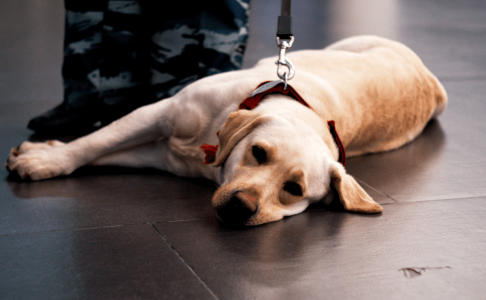Service dog kicked out of hotel room: 'People just don't seem to understand'
- Replies 19
We understand and value service animals' immense impact on the lives of those who rely on them. They provide a sense of independence, confidence, and companionship, acting as a lifeline for individuals facing various challenges.
That is why it is disheartening to hear stories of individuals facing misunderstandings and discrimination simply because they rely on these remarkable animals.
Recently, we came across the case of Janice Whittle, a visually impaired woman from Queensland, and her loyal guide dog, Keegan.
Janice encountered an unwelcome surprise when she attempted to check into the National Hotel in Toowoomba. To her dismay, she was informed that she had to leave because of her service dog.

The 53-year-old had just placed her bag on the bed when she heard a knock at her door. 'I am being kicked out of the National Hotel, which I have just paid for the accommodation,' Whittle said as she filmed the interaction.
An employee explained that she could request a refund and informed Whittle that her booking would have been cancelled earlier if the hotel had been aware of the service dog.
'You didn't state that you had a service animal, and if you did, we would have refunded it before,' the employee said.
In response, Whittle presented her three-year-old guide dog's identification.
Unfortunately, the hotel's stance remained the same.'Eventually, she came back and said that she did it through Policelink, so the police will not be attending, but I will be getting charged,' Whittle explained.
It's important to note that under Queensland law, handlers and certified dogs have access rights to public places and places of accommodation, including hotels and motels.
Despite this, Whittle revealed that she is often refused entry to various establishments and is tired of the constant discrimination. 'We are talking cafes, restaurants, hotels, accommodations, retail outlets,' she said. 'People just don't seem to understand that guide dogs are legally allowed anywhere that I go.'
The National Hotel in Toowoomba later admitted that their young staff member made a mistake. In a statement, the hotel apologised and informed Whittle that she would be welcome to stay at the venue, but she declined. The hotel emphasised its ongoing commitment to inclusivity for people with disabilities.

Guide dogs are far from mere pets; they are working animals that have undergone rigorous training and certification programs to assist individuals with disabilities. Their calm and well-behaved demeanour is a testament to these specialised training efforts.
In Australia, individuals with guide dogs continue to face discrimination and denial of access to public places, despite being illegal under The Commonwealth Disability Discrimination Act 1992.
Across all states and territories, guide dogs wearing a harness with their handler are legally allowed to enter public places, public transport, taxis, and ride-shares. Denying or charging a fee for the entry of a guide dog is considered an offence.
Guide Dogs Australia reported that over a third of guide dog handlers experienced denial of access to a public venue or transport within the past year. This is not only a violation of their rights but also creates feelings of unsafety and potential danger.
Such incidents underscore the need for greater awareness surrounding the rights of individuals relying on service animals and the invaluable roles these animals play in providing assistance, support, and independence.

It's frustrating and heartbreaking to hear of such discrimination. Service dogs are not just pets but carefully bred and schooled animals working to make the lives of their handlers easier.
We here at the SDC want to remind everyone that it is illegal for a business to deny entry to a service dog. For all of our members with disabilities, please remember that you have the right to access all public places, services, and transport without discrimination in Australia.
If you ever encounter a situation where you are denied access due to your guide dog, feel free to get in touch with Guide Dogs Australia through their website. They can offer guidance on dealing with discrimination and provide resources to address such situations.
Do you or anyone you know have service dogs that assist them in their daily life? Have you come across any incidents or heard any stories of unfair treatment or discrimination? Please feel free to share in the comments below.
That is why it is disheartening to hear stories of individuals facing misunderstandings and discrimination simply because they rely on these remarkable animals.
Recently, we came across the case of Janice Whittle, a visually impaired woman from Queensland, and her loyal guide dog, Keegan.
Janice encountered an unwelcome surprise when she attempted to check into the National Hotel in Toowoomba. To her dismay, she was informed that she had to leave because of her service dog.

A hotel has come under fire after a visually impaired woman was told to leave by a staff member because she had a service dog with her. Credit: Unsplash/brunocervera.
The 53-year-old had just placed her bag on the bed when she heard a knock at her door. 'I am being kicked out of the National Hotel, which I have just paid for the accommodation,' Whittle said as she filmed the interaction.
An employee explained that she could request a refund and informed Whittle that her booking would have been cancelled earlier if the hotel had been aware of the service dog.
'You didn't state that you had a service animal, and if you did, we would have refunded it before,' the employee said.
In response, Whittle presented her three-year-old guide dog's identification.
Unfortunately, the hotel's stance remained the same.'Eventually, she came back and said that she did it through Policelink, so the police will not be attending, but I will be getting charged,' Whittle explained.
It's important to note that under Queensland law, handlers and certified dogs have access rights to public places and places of accommodation, including hotels and motels.
Despite this, Whittle revealed that she is often refused entry to various establishments and is tired of the constant discrimination. 'We are talking cafes, restaurants, hotels, accommodations, retail outlets,' she said. 'People just don't seem to understand that guide dogs are legally allowed anywhere that I go.'
The National Hotel in Toowoomba later admitted that their young staff member made a mistake. In a statement, the hotel apologised and informed Whittle that she would be welcome to stay at the venue, but she declined. The hotel emphasised its ongoing commitment to inclusivity for people with disabilities.

Handlers and certified dogs have access rights to public places and places of accommodation, which include hotels and motels. Credit: Unsplash/labunsky.
Guide dogs are far from mere pets; they are working animals that have undergone rigorous training and certification programs to assist individuals with disabilities. Their calm and well-behaved demeanour is a testament to these specialised training efforts.
In Australia, individuals with guide dogs continue to face discrimination and denial of access to public places, despite being illegal under The Commonwealth Disability Discrimination Act 1992.
Across all states and territories, guide dogs wearing a harness with their handler are legally allowed to enter public places, public transport, taxis, and ride-shares. Denying or charging a fee for the entry of a guide dog is considered an offence.
Guide Dogs Australia reported that over a third of guide dog handlers experienced denial of access to a public venue or transport within the past year. This is not only a violation of their rights but also creates feelings of unsafety and potential danger.
Such incidents underscore the need for greater awareness surrounding the rights of individuals relying on service animals and the invaluable roles these animals play in providing assistance, support, and independence.
Key Takeaways
- A visually impaired woman with a service dog was told to leave a hotel in Queensland.
- The hotel employee claimed the woman did not inform them of the service animal when booking and offered her a refund.
- Under Queensland law, handlers and certified dogs have access rights to public places and places of accommodation, including hotels and motels.
- The hotel has since apologised and informed the woman she was welcome to stay, but she declined.
It's frustrating and heartbreaking to hear of such discrimination. Service dogs are not just pets but carefully bred and schooled animals working to make the lives of their handlers easier.
We here at the SDC want to remind everyone that it is illegal for a business to deny entry to a service dog. For all of our members with disabilities, please remember that you have the right to access all public places, services, and transport without discrimination in Australia.
If you ever encounter a situation where you are denied access due to your guide dog, feel free to get in touch with Guide Dogs Australia through their website. They can offer guidance on dealing with discrimination and provide resources to address such situations.
Do you or anyone you know have service dogs that assist them in their daily life? Have you come across any incidents or heard any stories of unfair treatment or discrimination? Please feel free to share in the comments below.







